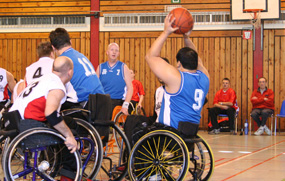Home page Description:
TRI Scientists are developing a customized self-management program
Posted On: February 23, 2015

Image Caption:
According to the Rick Hansen Institute, 86,000 people are living with spinal cord injuries in Canada.
A spinal cord injury, which occurs when the spinal cord is damaged by trauma or disease, can result in partial or complete paralysis. People who have sustained a spinal cord injury are at higher risk of developing debilitating complications including pain, depression and difficulties controlling their breathing, bladder and bowels. In light of these findings, researchers are examining new approaches to promote the health and well-being of people living with spinal cord injuries.
TRI Senior Scientist Dr. Susan Jaglal is developing a self-management program for people with spinal cord injuries that will address their needs and, in parallel, engage and empower them. Recently, a team led by Dr. Jaglal and her doctoral student, Sarah Munce, consulted a group of Canadians with spinal cord injuries to obtain their perspectives on a self-management program.
For this study, 99 people with spinal cord injury from across Canada completed an online survey. Researchers found that approximately 75% of the respondents rated the development of the self-management program as “very important” or “important”. The greatest proportion of respondents believed that the program should include information about exercise, nutrition and pain management, and should be delivered through an internet-based format.
“Our findings could be used to inform the design and pilot testing of a self-management program tailored to the needs of individuals with spinal cord injuries to improve their health and quality of life. Further research is required to determine how the views of individuals with spinal cord injuries change over time,” said Dr. Jaglal.
This work was supported by the Canadian Institutes of Health Research, Knowledge Translation Canada and the Toronto Rehab Foundation.
Views of people with traumatic spinal cord injury about the components of self-management programs and program delivery: a Canadian pilot study. Munce SE, Fehlings MG, Straus SE, Nugaeva N, Jang E, Webster F, Jaglal SB. BMC Neurol. 2014 Oct 21 [Pubmed Abstract]
TRI Senior Scientist Dr. Susan Jaglal is developing a self-management program for people with spinal cord injuries that will address their needs and, in parallel, engage and empower them. Recently, a team led by Dr. Jaglal and her doctoral student, Sarah Munce, consulted a group of Canadians with spinal cord injuries to obtain their perspectives on a self-management program.
For this study, 99 people with spinal cord injury from across Canada completed an online survey. Researchers found that approximately 75% of the respondents rated the development of the self-management program as “very important” or “important”. The greatest proportion of respondents believed that the program should include information about exercise, nutrition and pain management, and should be delivered through an internet-based format.
“Our findings could be used to inform the design and pilot testing of a self-management program tailored to the needs of individuals with spinal cord injuries to improve their health and quality of life. Further research is required to determine how the views of individuals with spinal cord injuries change over time,” said Dr. Jaglal.
This work was supported by the Canadian Institutes of Health Research, Knowledge Translation Canada and the Toronto Rehab Foundation.
Views of people with traumatic spinal cord injury about the components of self-management programs and program delivery: a Canadian pilot study. Munce SE, Fehlings MG, Straus SE, Nugaeva N, Jang E, Webster F, Jaglal SB. BMC Neurol. 2014 Oct 21 [Pubmed Abstract]





Comments